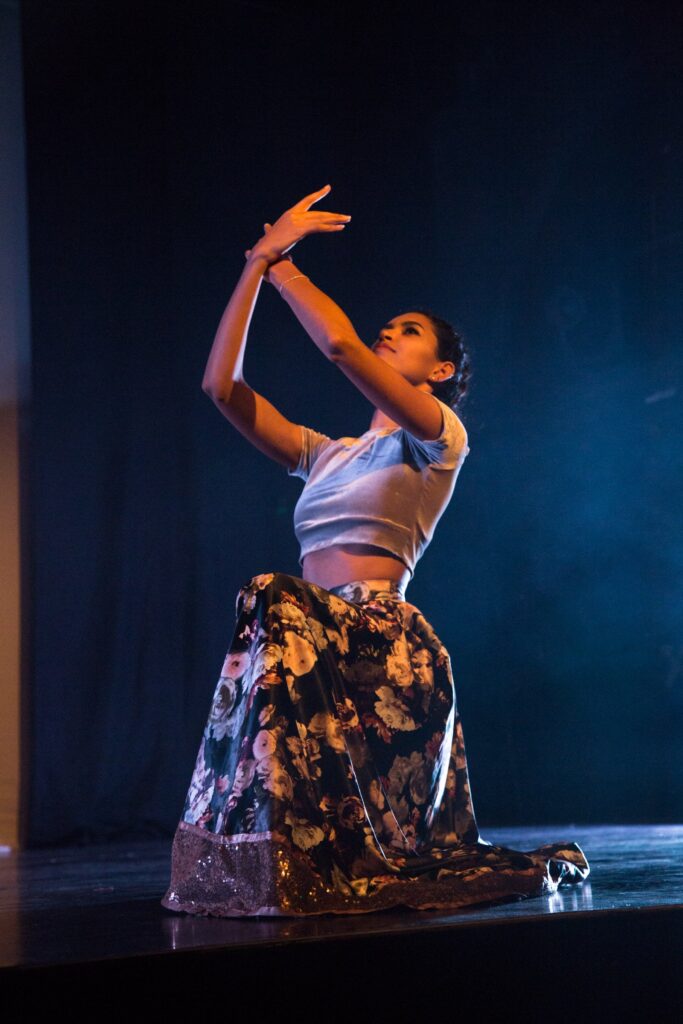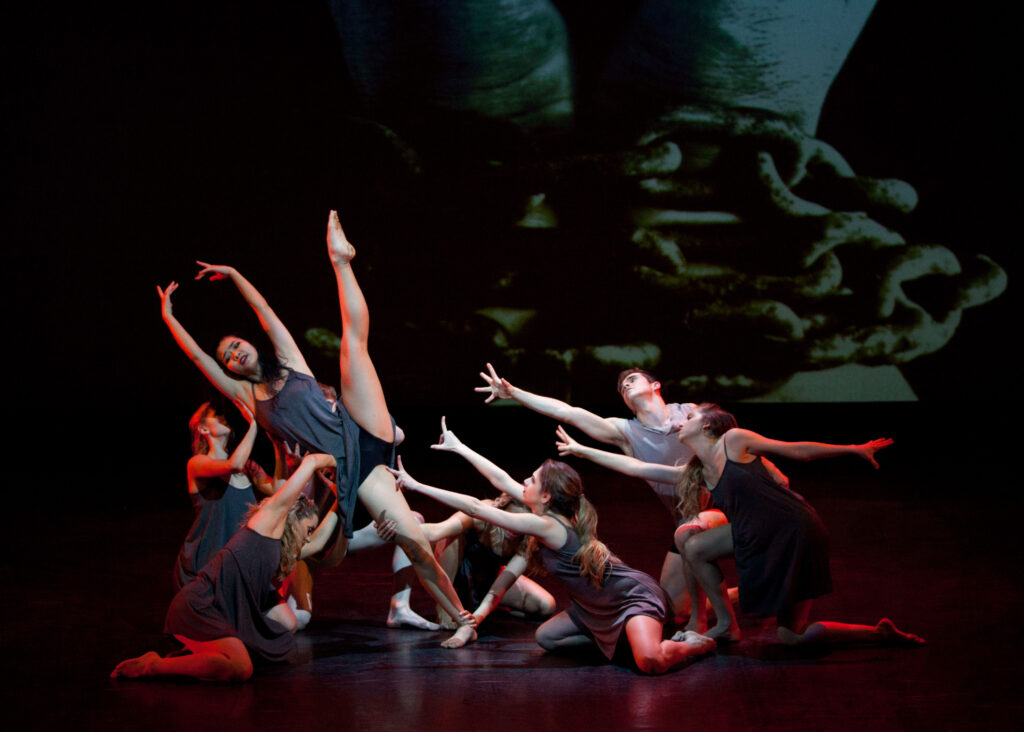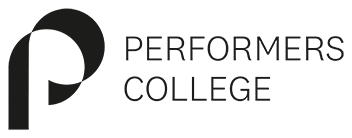BA (Hons) Performing Arts (Top-Up)
Are you passionate to learn more about your craft?
If you hold a UK Level 5 qualification (or equivalent) or a Trinity College London Professional Diploma in Performing Arts or a similar subject and wish to earn a full honours degree, our flagship BA (Hons) in Performing Arts and its two unique pathways, provides in-depth training shaped by current industry trends.
Our specialised one-year Degree Top-up programme has been designed to enable committed performers to extend their understanding of performing arts in either: Contemporary Musical Theatre or Acting for the 21st Century.
The course offers students and practitioners the opportunity to explore aspects of these pathways not usually addressed in vocational training and provides access to further HE study and enhanced employment opportunities when considering career progression.
As part of our Top Up Degree, you have the chance to select from specific options to meet the needs of the industry. Here you can diversify your training and home in on areas you may have previously explored in less depth. This is a crucial element of training as you can explore your identity as an emerging creative artist.

This course encourages independence, entrepreneurialism, and innovation because any performer entering the contemporary performing arts industry will require these qualities. We don’t want you just to get work; we want you to create work.
All learning is underpinned by mental and physical resilience classes, another critical element of your training.
You will need to be resilient on entering this notoriously hard profession. You should also be equipped with life skills, which you can apply within various contexts far beyond your training.
This course is validated by BIMM University and taught at Performers College. Upon successful completion, students receive a degree from BIMM University.

Course Specification
Mode of Attendance: Full-time
Length of course: 3 years (final year only via Top-Up Route)
Awarding institution: BIMM University
Campus delivery: Brighton and Manchester
Language of study: English
Final award: Bachelor of Arts (Hons)
Minimum Requirements
Completion of Level 5 Qualification or Trinity College London Professional
Diploma: Higher National Diploma, FdA, FdSC in performing arts or a related subject.
English language requirements: IELTS 6.0 overall, with 6.0 in writing and a minimum of 5.5 in other elements.
Progression
Graduates can progress directly to employment in theatre and related creative industries.
Course Fees
Student loan finance is available for BA (Hons) in Performing Arts. Please visit our Fees page for information on access to Student Loans. Please note, UK and EU students eligible for Loans are able to borrow the full course fee for Performers College degrees..
Year 3:
All students take the following core modules in their third (and final) year of study, plus one optional module.
The option modules advertised as available for Performers College courses are subject to variation dependant on minimum student numbers and the availability of specialist resources at each college (Please refer to our terms and conditions for further detail).
In this module, you will undertake a significant project of your own choosing. It’s your chance to explore your passion within the industry and creative arts: experiment, take risks, strengthen your skills and create a product/cohesive portfolio of work that you are proud to showcase at the end of your degree. This module will support you in consolidating the broad learning and development from the course so far, building a bridge into the industry, the workplace and future opportunities. You will be supported to self-direct your own learning through a series of lectures, seminars and 1:1 tutorials with expert supervisors.
This module is designed to build on your previous experience of performance and to apply your learning within the context of a production. The nature of the piece you work on will be appropriate to the route you are studying. You will rehearse intensively towards a production, which will be director-led. Rehearsal etiquette preparation and discipline will be core elements of your process during this module and will contribute significantly to the assessment. You will be expected to utilise your skill – sets with proficiency and assurance as well as engage openly and with creativity to the demands of the piece.
Following on from Performance 1 in the previous semester, this module is designed to build on your experience. Performance 2 provides you with the opportunity to apply what you have learnt in terms of approach and technique. within the context of a second production. It allows you to explore any strategies, approaches or methodologies that have arisen from your reflections on the previous performance. It also gives you the chance to work with a different director, and potentially a different process in the rehearsal room. This will be invaluable as a performer you will need to be able to adjust and respond to a variety of directorial styles. The nature of the piece you work on will be appropriate to the route you are studying. You will rehearse intensively towards a production, which will be director-led. Rehearsal etiquette preparation and discipline will be core elements of your process during this module and will contribute significantly to the assessment. You will be expected to utilise your skill – sets with proficiency and assurance as well as engage openly and with creativity to the demands of the piece.
This module is the final step in your journey and will support you as you look to enter your chosen field as a creative professional. Drawing on evidence from throughout your time here. you will critically self-evaluate your personal learning journey and industry engagements to date. You will explore concepts and theories of personal and professional development to support, challenge and test your assumptions, to determine your readiness for work in the creative industries. You will have the opportunity to discuss this with your peers and learn from your collective experiences in both small degree path groups and large mixed discipline sessions.
With this position in mind, you will then be challenged to create and consolidate creative assets to give you the edge over the competition in your chosen field. Specialist workshops will be offered throughout the module, informed and delivered by our wide-reaching connections and specialist tutors in the creative industries. This culminates in the creation of a portfolio which tells the story of your personal and professional journey so far, communicating your unique professional identity and future career plans in the creative industries.
This module is designed to build on your previous experience of acting for camera, and to deepen both your ability and confidence in this medium. You will become familiar with both the physical nature of a set as well as all the roles that contribute to creating film & TV. You will embed the terminology involved so that you will fully understand what is being asked or discussed when you are in front of the camera. All sessions will be practical, allowing you the maximum amount of time to become comfortable being filmed and to make sure you fully understand the acting requirements for different shots and situations. You will revisit previously explored acting methodologies, such as Meisner and Stanislavsky in order to deepen the quality of your work. During the sessions, you will be given scripts that make different demands on you in terms of style and choice. You will become used to working with little rehearsal, depending on the genre, and to make clear decisions quickly. Audition technique for film and TV will play a part in the practical sessions as will self-taping.
Whether it’s Voice-Over, Performance Capture or VR, this module will provide you with a basic understanding of immersive narrative storytelling and encourage you to develop your skills in order to create and deliver believable characters in the medium. This module will also introduce you to a variety of transferrable skills to expand your confidence and versatility as a performer. These include effective audition technique, studio etiquette, good sight-reading and voice technique, microphone technique, facial capture, as well as experience working in the field of Mo-cap and Pro-cap. Fundamentally this module will provide you with the experience and knowledge to empower you to find work in the fastest-growing sector of the entertainment industry.
This module will explore ensembles from different genres including opera, operetta, and Gilbert & Sullivan as well as a wide range of challenging musical theatre pieces. Rather than choral music, the works studied will be suitable ensemble pieces involving several characters all with their individual lines and harmonies. Pieces chosen will be dependent on the suitability of your vocal ranges, but it is anticipated that extracts will be taken from works such as The Marriage of Figaro, The Magic Flute, La Boheme, Carmen, The Mikado, HMS Pinafore, The Pirates of Penzance, The Merry Widow, Die Fledermaus, Les Miserables, The Phantom of the Opera, Natasha & the Great Comet of 1812, Curtains, Guys and Dolls etc.
By studying this module, you will improve your ensemble and harmony singing skills and increase your knowledge of a broader repertoire and of more advanced musical grammar. All points of musical expression will be discussed as well as looking closely at, and understanding, the layout of a vocal score. The skills acquired will give you a great advantage in any music rehearsal situation.
With such a diverse range of Musical Theatre productions being staged in the West End and across the UK, each has its own choreographic style that ranges from hip hop in Hamilton, disco in The Tina Turner Musical, lyrical/Ballet in An American in Paris, Fosse/Jazz in Chicago (to name a few), it is ever more apparent that dancers need to have a broad range of dance vocabulary, technique and styles within their repertoire.
In this module, you will take part in genre-based performance workshops designed to increase knowledge and development of the key technical elements and choreography associated with different styles of current MT productions. Topics include style-specific choreography and associated techniques as used within contemporary musical theatre.
This module focusses on the creation and delivery of a piece of work devised specifically to be filmed. You will take agency for your own work by choosing your specific area of performance. This can be purely a dance piece, or you might wish to explore using vocals or create a short piece with a clear narrative focus. It might well be that ultimately you incorporate several elements into your work, but the key factor is that you are responsible for producing a piece of art in video form. Through engaging with this process, not only will you work creatively by drawing on your inspirations and influences, but you will also learn the relevant techniques for performance in front of a camera. This knowledge will extend to an understanding of the different roles undertaken on a film set, providing you with a fuller knowledge of the medium. The module also provides you with an opportunity to discover both the limitations, as well as the range of possibilities open to you as an artist working for film. Professional protocol will be a key aspect of your learning. You will showcase your work to a panel and engage in a thorough discussion both about your process, but also concerning how you might promote and market your work.
As Theatre, TV, Film and Video Games move towards a level of expertise usually reserved for actors with greater physical skill, it is now becoming apparent that performers need to think of themselves as a complete actor. An actor who has as much skill physically as they do vocally.
In this module we will look at what it means to connect the disciplines fully, to create a truly versatile and individual performer, exploring how to work as an ensemble, how to story tell a story in its purest form, how to use our bodies to communicate, how to devise collaboratively in order to create theatre which is embodied and expressed through our physicality as much as the words we use. In this module, you will utilise your skills in performance and channel your imaginations in order to, not only deepen your ability as actors but also become theatre-makers.
April Pearson is an award-winning actor, writer and producer with over 20 years’ experience in film,…
B Terry is a versatile performer with notable credits in both theatre and dance. Their stage…
Barney is an arts and events manager and educator who has had a career of over…
Callum graduated with a B.A. in Acting from Manchester University. Since then he has worked across…
Clair trained at the Susan Robinson School in Byfleet. She was awarded the Phyllis Bedells Bursury…
Claire has worked as a freelance dance teacher for 13 years, having trained at Middlesex University…
Linn recording artist, Claire Martin OBE has established herself as a tour de force on the…
Dan has worked as a physio for over 8 years, with the majority of his time…
Danny trained at Leeds Conservatoire, where he studied Music with a focus on production, harmony and…
Any questions?
For any questions regarding our courses or if you’d like more information on how to apply to Performers College, please contact our Enquiries Team on 01273 840 346 or email [email protected].

